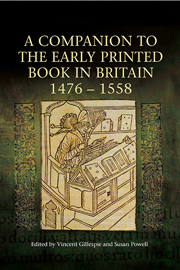Book contents
- Frontmatter
- Contents
- List of Illustrations
- List of Contributors
- Preface
- Acknowledgements
- Abbreviations
- Chronology of the Period
- Introduction
- I THE PRINTED BOOK TRADE
- II THE PRINTED BOOK AS ARTEFACT
- III PATRONS, PURCHASERS AND PRODUCTS
- IV THE CULTURAL CAPITAL OF PRINT
- 12 Humanism and Printing
- 13 Women Translators and the Early Printed Book
- 14 The Printed Book Trade in Response to Luther: English Books Printed Abroad
- 15 Thomas More, Print and the Idea of Censorship
- 16 Catholicism, the Printed Book and the Marian Restoration
- Index of Manuscripts
- Index of Printed Books
- General Index
13 - Women Translators and the Early Printed Book
from IV - THE CULTURAL CAPITAL OF PRINT
Published online by Cambridge University Press: 05 April 2014
- Frontmatter
- Contents
- List of Illustrations
- List of Contributors
- Preface
- Acknowledgements
- Abbreviations
- Chronology of the Period
- Introduction
- I THE PRINTED BOOK TRADE
- II THE PRINTED BOOK AS ARTEFACT
- III PATRONS, PURCHASERS AND PRODUCTS
- IV THE CULTURAL CAPITAL OF PRINT
- 12 Humanism and Printing
- 13 Women Translators and the Early Printed Book
- 14 The Printed Book Trade in Response to Luther: English Books Printed Abroad
- 15 Thomas More, Print and the Idea of Censorship
- 16 Catholicism, the Printed Book and the Marian Restoration
- Index of Manuscripts
- Index of Printed Books
- General Index
Summary
Translations in the first century of printing in England played an extremely important role in a variety of fields, although the full extent of their contribution to the intellectual, social and cultural advancement of the country has not yet been fully explored. They constituted an integral part of a whole web of diverse activities, including the gradual development of a native literary tradition, the dissemination of knowledge in a wide variety of fields, the spread of social and political movements, and the exchanges involved in religious controversy. The specific relationship of translation to the early print trade is a crucial one that also remains to be studied. Yet we know enough to claim that translations do not exist in a void and that it is therefore wrong to discuss an individual translated work as an isolated production, rather than one of a range of works published at the same time on the same subject and in similar socio-historical circumstances. Nor should one ignore the ideological motivations of both translator and printer, whether these be inspired by intellectual curiosity, altruism, patriotism, faith or the marketplace.
In discussing the work of seven women translators published between 1504 and 1557 the backdrop of cultural and socio-historical events and the context of print become particularly significant, for they give the lie to the old claim that translating was a safe and silent task particularly suited to women, performed in a proscribed and private space and of little impact.
- Type
- Chapter
- Information
- A Companion to the Early Printed Book in Britain, 1476-1558 , pp. 248 - 271Publisher: Boydell & BrewerPrint publication year: 2014



